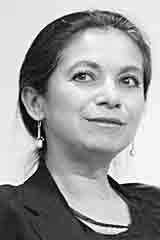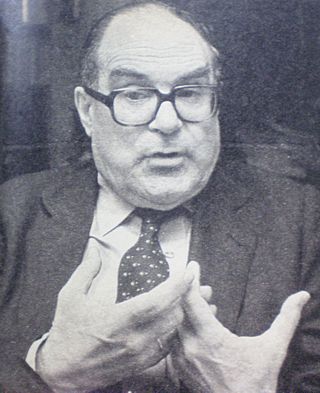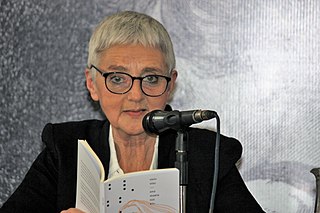Related Research Articles

Luisa Valenzuela Levinson is an Argentine post-'Boom' novelist and short story writer. Her writing is characterized by an experimental style which questions hierarchical social structures from a feminist perspective.

Carmen Boullosa is a Mexican poet, novelist and playwright. Her work focuses on the issues of feminism and gender roles within a Latin American context. It has been praised by a number of writers, including Carlos Fuentes, Alma Guillermoprieto, Roberto Bolaño and Elena Poniatowska, as well as publications such as Publishers Weekly.

Julián Marías Aguilera was a Spanish philosopher associated with the Generation of '36 movement. He was a pupil of the Spanish philosopher José Ortega y Gasset and member of the Madrid School.

Paco Ignacio Taibo II, also known as Paco Taibo II or informally as PIT is a Spanish-Mexican writer, novelist and political activist based in Mexico City. He is most widely known as the founder of the neopolicial genre of novel in Latin America and is also a prominent member of the international crime writing community. His Spanish language work has won numerous awards including two Latin American Dashiell Hammett Prizes. In 2018, Taibo was appointed as head of the Fondo de Cultura Económica by President Andrés Manuel López Obrador.

Juan Gelman was an Argentine poet. He published more than twenty books of poetry between 1956 and his death in early 2014. He was a naturalized citizen of Mexico, country where he arrived as a political exile of the Military Junta.
Eduardo Gudiño Kieffer was an Argentine writer.

Arturo Carrera is an Argentine poet.

Susana Calandrelli was an Argentine writer and teacher.

Luis (Leopoldo) Franco was an Argentine autodidact, a self-made intellectual, essayist, and poet.

Jorge Salcedo was a popular Argentine actor of radio, television and feature films, who appeared in film between 1941 and 1980.
Alejandro Rozitchner is an Argentine writer. "Artist of the ideas" or "intellectual nutritionist" are some of the names with which he describes his work. He is characterized by his affirmative thinking, his appreciation for enthusiasm, and for his open, casual, and provocative style.
Gregorio Selser was an Argentine journalist and historian. He published an extensive bibliography critical of globalization, imperialism, and covert operations implemented by the CIA in Latin America, in particular.
The Argentine Constitutional Reforms of 1949 were approved during Juan Domingo Perón's government. This new constitution was a major revision of the Constitution of Argentina. Its goal was to modernize and adapt the text to the twentieth century's concepts of democracy, with a bill of social rights, including better working conditions for the working class, right to education, etc. It also allowed for the indefinite reelection of the president.

Carlos María Domínguez is an Argentine writer and journalist who has lived in Montevideo since 1989.
Omar Acha is an Argentine historian and political essayist. He is a researcher at the Consejo Nacional de Investigaciones Científicas y Técnicas and also at the Centro de Investigaciones Filosóficas (Argentina). He teaches Philosophy of History at the Universidad de Buenos Aires. He was also a member of the editorial board of Herramienta. Revista de Teoría y Crítica Marxista, published in Buenos Aires.

Ana María del Río is a Chilean literature professor, feminist writer, and novelist. Her honors include the Santiago Municipal Literature Award and the María Luisa Bombal Award.

Fernando Nadra was an Argentine lawyer, journalist and public speaker. He was one of the most important leaders of the Partido Comunista Argentino and, from his Marxist ideological perspective, took part in most of the important political debates of his time. He stood out from other left-wing leaders of his time for his abilities as an organizer and collective activist, and his numerous attempts to promote agreement among different political sectors through pluralistic dialogue.
Emilio Rodríguez was a Spanish actor. During the Spanish post-war, he worked as a police man and he was a volunteer at División Azul. Between 1950 and 1960 he was a supporting actor. He played Inspector Ballestero in Deadfall (1968), starring Michael Caine, and Warden in Kid Rodelo (1966) At the age of 50 he retired for health problems, and then he starred in Crónicas de un pueblo, in the role of the teacher D. Antonio. After the death of Francisco Franco he was categorized as a francoist character. He finally appeared in Verano azul, and died in 1983.

Guillermo Cabanellas de Torres was a Spanish historian, labor lawyer, publisher, and lexicographer who carried out his work in Spain, Paraguay, and Argentina.
References
- ↑ "Ernesto Mallo – Bitter Lemon Press". bitterlemonpress.com. Retrieved 2015-12-30.
- ↑ Abanico. Revista de Letras en la Biblioteca Nacional de la República Argentina. Ernesto Mallo, "La Aguja en el Pajar".